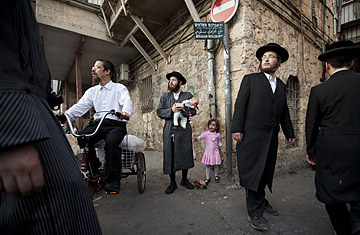
Ultra Orthodox Jews attend the funeral of Rabbi Yosef Shalom Elyashiv in Jerusalem, Wednesday, July 18, 2012. Elyashiv, revered by Jews worldwide as the top rabbinic authority of this generation for his scholarship and rulings on complex elements of Jewish law, died Wednesday, hospital officials said. He was 102.
(3 of 6)
The munificence is changing the complexion of the city. At city hall on the day of our interview, Pindrus had appointments with three ultra-Orthodox groups looking to open kindergartens--the bellwether of a neighborhood turning black. In Jerusalem, the children of the very religious account for 65% of elementary-school pupils. Across Israel, where ultra-Orthodox now account for 10% of the population, they make up 21% of elementary-school enrollment. Demographers calculate that with a birthrate three to four times that of seculars, they will account for 1 in 5 Israelis in 20 years.
"We'll give you a good price because we want you out of here," a man in a black hat told a woman named Etty Ohaion when he knocked at her door one recent day. A lot of people would have sold.
Almost wiped out by the Nazis, the ultra-Orthodox now unnerve others with their fecundity, overflowing districts built expressly for them, conquering neighborhoods designated for others. But something was afoot in Kiryat Yovel. Ohaion closed her door. And when a religious man made an offer to Pinchasi's neighbor, the urban guerrilla took things up a notch. "I have barbecues during Shabbat," Pinchasi told the man, keenly aware of the prohibition on fire on the Sabbath. "Pork. We're going to play music. We smoke." His eyes danced. "And we bring prostitutes here. "
The man bought anyway, perhaps driven by the housing market's law of supply and demand. One thousand religious couples wed in the city each year and start looking for a place of their own in the Holy City. Jerusalem is surrounded on its north, south and east by Palestinian territory, and they could move there. But Israel pays a political price every time it builds there. "Where am I supposed to go?" asks Gibli, on a park bench in Kiryat Yovel, which lies to the west.
Attacks and Counterattacks
Kiryat Yovel translates as "Jubilee Town." Named to commemorate the 50th anniversary of the organization that began purchasing land for a future state, its streets are named for countries that voted to affirm Israel's entry into the U.N. General Assembly and for the heroes of Zionism, the ideology that demanded the country's creation. The neighborhood was never homogeneous: professors can be found in the single-family homes with the commanding views. Lower down lies Stern Street, named for the fascist founder of the preindependence Stern Gang and the progenitor of a gang of its own: delinquents from the high-rises hastily built to shelter the poorest immigrants. Still, until the ultra-Orthodox began buying about eight years ago, the area was overwhelmingly secular.
